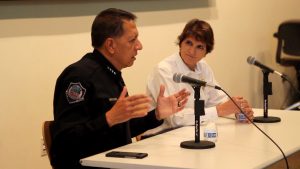- Slug: BC-CNS-Latino Town Hall, 729 words
- Photo available below.
By ANDREA JARAMILLO VALENCIA
Cronkite News
MESA ‒ For the new Mesa Police Chief Ramon Batista, engaging with the community is just as important, if not more, than “catching bad guys.”
“It’s important for all of us to get out of the car and walk and meet the community,” Batista said during the Latino Town Hall meeting in Mesa on Saturday, where he reiterated several times the importance of having a close relationship with the community.
For Batista, it’s essential for good policing.
“It’s like the relationships we have at home. If we don’t work on our relationships at home, those relationships will begin to fall apart. I look at it in the same manner for us in our organization with the city that plays a pivotal role in interaction and relationship building between government and community,” he said.
Batista gave the example of having policemen on bikes as a more friendly and approachable way for officers to interact with community members.
The Latino population in Mesa makes up 27 percent of the city, and 9 percent of the total population speak English “less than very well” according to census data, most of them are Spanish speakers.
Batista, a Spanish speaker himself, was the Tucson Assistant Police Chief before replacing John Meza last December. During the town hall, he was asked by an audience member what the department was doing to reflect the city’s demographics. He said between 40 and 50 percent of the officers that recently graduated are diverse, and cited former Dallas Police Chief David Brown.
“(He said) ‘If you want to change the way you see policing occurring in our communities, the join our ranks.’ I applaud him for saying that because it’s absolutely true.”
Nikolas Rasheta, is a detective with the Mesa Police Department. Although his last name may not sound Latino, Rasheta’s mother is Mexican and he speaks Spanish fluently.
“When we respond to a community and there’s a barrier in language, then we miss out on some of the facts and information that’s timely for us,” Rasheta said. “In many cases, as soon as they realize I speak Spanish, you can just see relief in their face.”
In other cases, he said, community members are not as pleased when they find out he speaks Spanish because they may have said something they didn’t want him to hear.
According to 2013 data from the Bureau of Justice Statistics, the Mesa Police Department is made up of officers who are 80 percent white, three percent black, 14 percent Latino and two percent Asian.
But language barriers were not the only concerns audience members had.
“When they dial 911, who’s actually going to help them? Because there’s a concern that ICE is going to go and there’s a fear in the community,” an attendant said.
Batista recognized that lack of trust and fear of deportation was an issue that police departments in Arizona face since SB1070 ‒ which gives officers permission to ask about a person’s immigration status during a lawful stop, detention or arrest ‒ but it’s exacerbated during the current administration’s tough stance on immigration.
“We have a stringent state law, we have a rhetoric coming from the White House that is not helpful for us as police chiefs in our environments that are trying to make a difference in our communities,” Batista said.
Deportation is a growing fear for immigrants in Arizona in the light of recent local and national events, while immigration arrests have increased during Donald Trump’s administration, according to The Arizona Republic.
Phoenix attorney Ray Ybarra Maldonado said there’s been an increase in traffic stops that lead to an ICE investigation.
“We see an increase, especially in the city of Phoenix, of police departments’ collaboration with ICE,” Ybarra said. “They don’t go out on raids together, we haven’t seen that, but what we’re seeing is more people who are pulled over for traffic infractions, they’re still being held and ICE is given opportunity to speak with those people or arrest and detain those people.”
According to Batista, the Mesa Police Department’s job in the communities was “to address their needs and not to check their immigration status” because he wants them to feel safe reporting a crime.
“It just makes my job, our job, a little bit tougher in trying to reach out to the community and ensuring that our primary focus is not immigration enforcement,” Batista said.
